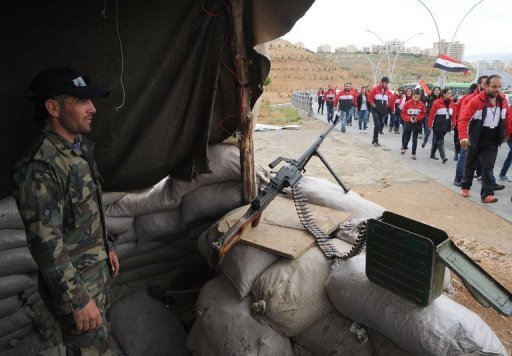By Waakhe Wudu / AFP
JUBA: Fierce border clashes between South Sudan and Sudan appeared to ease Friday, although the rival armies steeled themselves for fresh violence amid international fears of full-scale conflict.
World powers have urged restraint following the latest round of heavy fighting that first broke out Tuesday, with waves of aerial bombardment hitting the South, whose troops seized the Heglig oil field from Khartoum’s army.
“Things seem calm so far, no reports of bombings,” said Gideon Gatpan, Information Minister for South Sudan’s Unity border state, which has seen some of the worst fighting.
“We are still watching the skies in case there are attacks,” he said from the state capital Bentiu, which was bombed by Sudanese warplanes on Thursday.
Southern President Salva Kiir and his Khartoum counterpart Omar Al-Bashir have accused each other of seeking war, prompting a UN Security Council call for an immediate ceasefire.
Sudan has vowed to react with “all means” against a three-pronged attack it said South Sudanese forces had launched against it, but Khartoum army spokesman Sawarmi Khaled Saad said the counter-attack had not yet begun.
The heavy clashes, the worst since South Sudan won independence in July after one of Africa’s longest civil wars, have brought the two former foes close to a return to outright war.
The seizure of Heglig — which accounts for about half of Khartoum’s crude oil output — is a major economic setback to the north, while the military loss to the ex-rebel army of the South is a significant blow to Sudanese army pride.
“There is no new news about Heglig, we didn’t move towards Heglig,” said Saad.
Despite international calls, Juba has refused to withdraw from Heglig unless certain conditions are met, including Khartoum’s pullout from the neighboring Abyei region it holds, but which like Heglig is claimed by both sides.
Kiir, in a speech to parliament Thursday, said Bashir had “announced a total war with the Republic of South Sudan.”
Bashir also said South Sudan had “chosen the path of war, implementing plans dictated by foreign parties who supported them during the civil war.”
Parliaments in both nations have also called on citizens to take up defenses in case of war.
The unrest has prompted Khartoum to pull out of African Union-led crisis talks aimed at resolving the protracted dispute with Juba over oil, border demarcation, contested areas and citizenship issues.
The two sides are deadlocked over several issues left unresolved at the South’s independence, including the oil transit fees that the landlocked South must pay to transport crude to port in the north.
This week’s clashes follow border fighting that erupted last month between the neighbors, and which each side has blamed the other for starting.
Hundreds of thousands of citizens of each nation living in the other country are also facing uncertain futures after a deadline requiring them to formalize their status expired last weekend.

